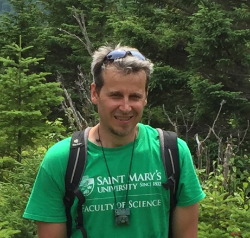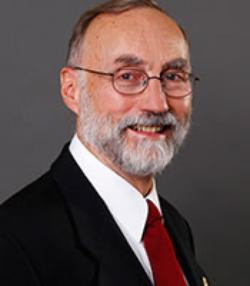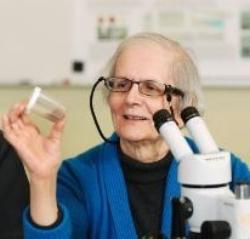Former Faculty
Dr. David Gauthier
 Dr. Gauthier, now retired, was a faculty member of Geography in Saint Mary’s University Department of Geography and Environmental Studies. He served as the University’s Vice-President (Academic and Research) and University Secretary from 2010 to 2016. Formerly at the University of Regina for 25 years, he served as that University’s Vice-President Research for 3 years, as well as founding the Centre for Geographic Information Systems (GIS) and serving 11 years as the Executive Director of the Canadian Plains Research Center (CPRC). Author of over 140 publications and recipient of over 120 academic awards, grants and contracts, Dr. Gauthier was active in international conservation research having conducted studies in protected ecological areas planning and management, ecological indicators for sustainable communities, applications of GIS in natural resources management, rural social cohesion, human adaptations to climate change, and ecological land classification. He was the General Manager and Publisher of the Encyclopedia of Saskatchewan. He has supervised, served on or administered committees for 40 graduate students.
Dr. Gauthier, now retired, was a faculty member of Geography in Saint Mary’s University Department of Geography and Environmental Studies. He served as the University’s Vice-President (Academic and Research) and University Secretary from 2010 to 2016. Formerly at the University of Regina for 25 years, he served as that University’s Vice-President Research for 3 years, as well as founding the Centre for Geographic Information Systems (GIS) and serving 11 years as the Executive Director of the Canadian Plains Research Center (CPRC). Author of over 140 publications and recipient of over 120 academic awards, grants and contracts, Dr. Gauthier was active in international conservation research having conducted studies in protected ecological areas planning and management, ecological indicators for sustainable communities, applications of GIS in natural resources management, rural social cohesion, human adaptations to climate change, and ecological land classification. He was the General Manager and Publisher of the Encyclopedia of Saskatchewan. He has supervised, served on or administered committees for 40 graduate students.
 Dr. Lundholm is an adjunct professor in the Department of Biology, an associate of CB Wetlands and Environmental Specialists, and a member of TransCoastal Adaptations: Centre of Excellence for Nature-Based Solutions. His research focuses on restoration ecology and plant communities in coastal areas. His favourite habitats are coastal barrens, tidal wetlands, and dunes. Dr. Lundholm ran the Ecology of Plants in Communities research lab for 18 years. During that time his students conducted the first research on green roofs in Atlantic Canada.
Dr. Lundholm is an adjunct professor in the Department of Biology, an associate of CB Wetlands and Environmental Specialists, and a member of TransCoastal Adaptations: Centre of Excellence for Nature-Based Solutions. His research focuses on restoration ecology and plant communities in coastal areas. His favourite habitats are coastal barrens, tidal wetlands, and dunes. Dr. Lundholm ran the Ecology of Plants in Communities research lab for 18 years. During that time his students conducted the first research on green roofs in Atlantic Canada.Dr. Robert McCalla Dr. McCalla is a Professor Emeritus with the Department of Geography and Environmental Studies. His research and teaching interests are in maritime transportation such as how to reduce the impacts of the shipping industry on the marine environment. He has published in journals such as Journal of Transport Geography, the Canadian Geographer and Maritime Policy and Management. He is also the author of Water Transportation in Canada (Formac, 1994).
Dr. McCalla is a Professor Emeritus with the Department of Geography and Environmental Studies. His research and teaching interests are in maritime transportation such as how to reduce the impacts of the shipping industry on the marine environment. He has published in journals such as Journal of Transport Geography, the Canadian Geographer and Maritime Policy and Management. He is also the author of Water Transportation in Canada (Formac, 1994).
Related:
Dr. Hugh Millward Dr. Hugh Millward is a Professor Emeritus in the Department of Geography and Environmental Studies. His specialty is urban geography, with a focus on development issues and land-use planning. This interest also extends to urban transportation planning and management. He contributed to the initial Halifax Regional Municipal Plan, approved in 2006, through his service on the Regional Planning Committee. He has also served on committees preparing district and local development plans, and was a long-time member of the Dartmouth Lakes Advisory Board. Currently he chairs the Halifax Active Transportation Advisory Committee.
Dr. Hugh Millward is a Professor Emeritus in the Department of Geography and Environmental Studies. His specialty is urban geography, with a focus on development issues and land-use planning. This interest also extends to urban transportation planning and management. He contributed to the initial Halifax Regional Municipal Plan, approved in 2006, through his service on the Regional Planning Committee. He has also served on committees preparing district and local development plans, and was a long-time member of the Dartmouth Lakes Advisory Board. Currently he chairs the Halifax Active Transportation Advisory Committee.
Dr. Millward’s recent research relates to geographical variations in urban transportation modes, with an emphasis on active-transport walking. This research seeks to understand how community location, density, and design promote or deter healthy and environment-friendly transport choices.
Courses taught:
- GEOG 4442/5642 Urban Planning
- GEOG 3340 Geography of Nova Scotia
Related:
Dr. Georgia Pe-Piper Dr. Pe-Piper, now retired, was appointed in the Department of Geology. Her research interests include the use of mineralogy and geochemistry to interpret the origins of igneous rocks, the source and origins of petroleum reservoirs, and the interpretation of ancient landscapes. She works particularly in Nova Scotia and the Aegean region (Greece). Her present work includes: origins of young volcanic eruptions in the Aegean; granites and associated mineral deposits, particularly rare-earth element minerals, in the Cobequid Highlands, Nova Scotia; and reconstructing the sources and history of sandstone reservoirs for petroleum in the offshore Scotian Basin. She contributes to the SOE a broad technical understanding of natural resources, both energy and minerals, and knowledge of natural hazard issues.
Dr. Pe-Piper, now retired, was appointed in the Department of Geology. Her research interests include the use of mineralogy and geochemistry to interpret the origins of igneous rocks, the source and origins of petroleum reservoirs, and the interpretation of ancient landscapes. She works particularly in Nova Scotia and the Aegean region (Greece). Her present work includes: origins of young volcanic eruptions in the Aegean; granites and associated mineral deposits, particularly rare-earth element minerals, in the Cobequid Highlands, Nova Scotia; and reconstructing the sources and history of sandstone reservoirs for petroleum in the offshore Scotian Basin. She contributes to the SOE a broad technical understanding of natural resources, both energy and minerals, and knowledge of natural hazard issues.
Related: